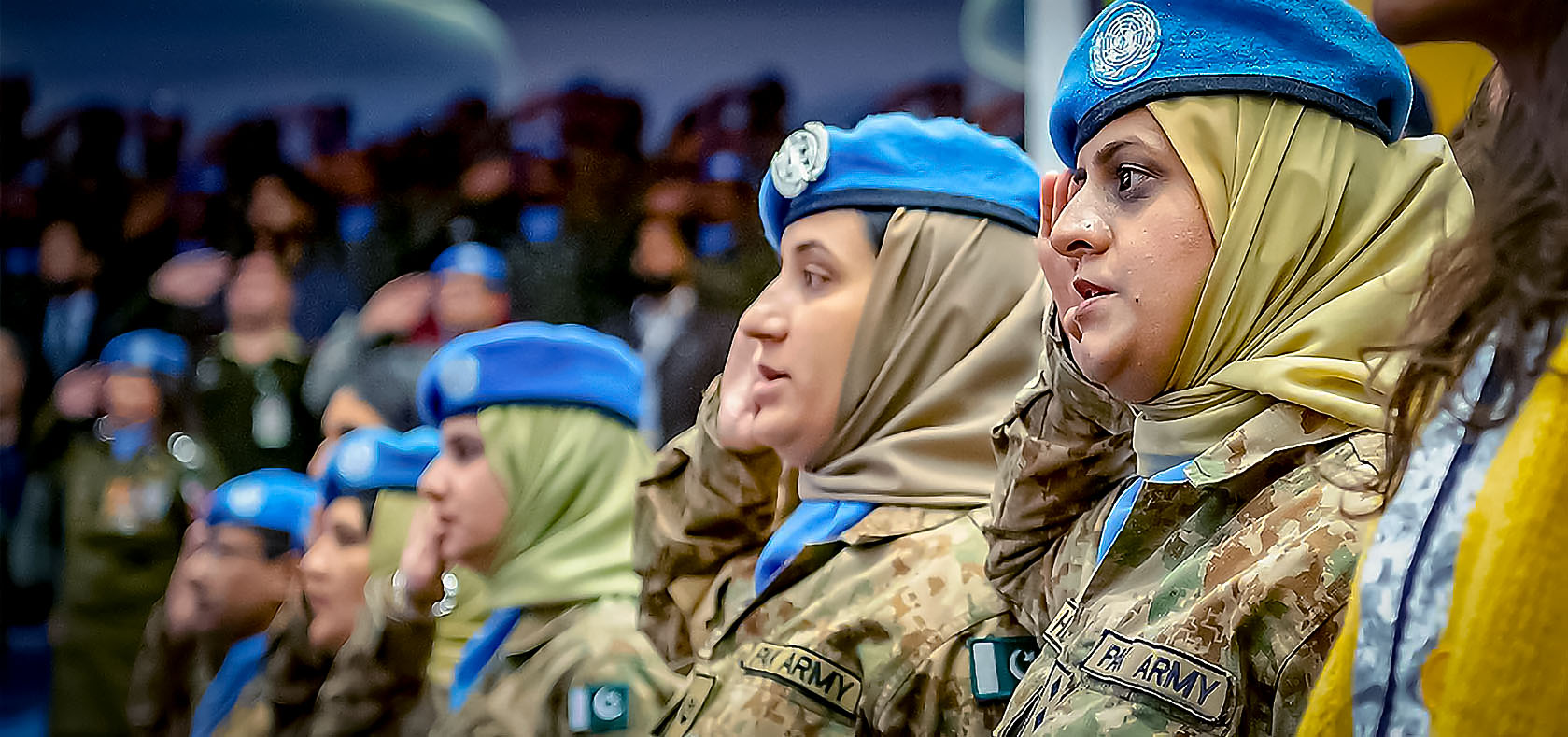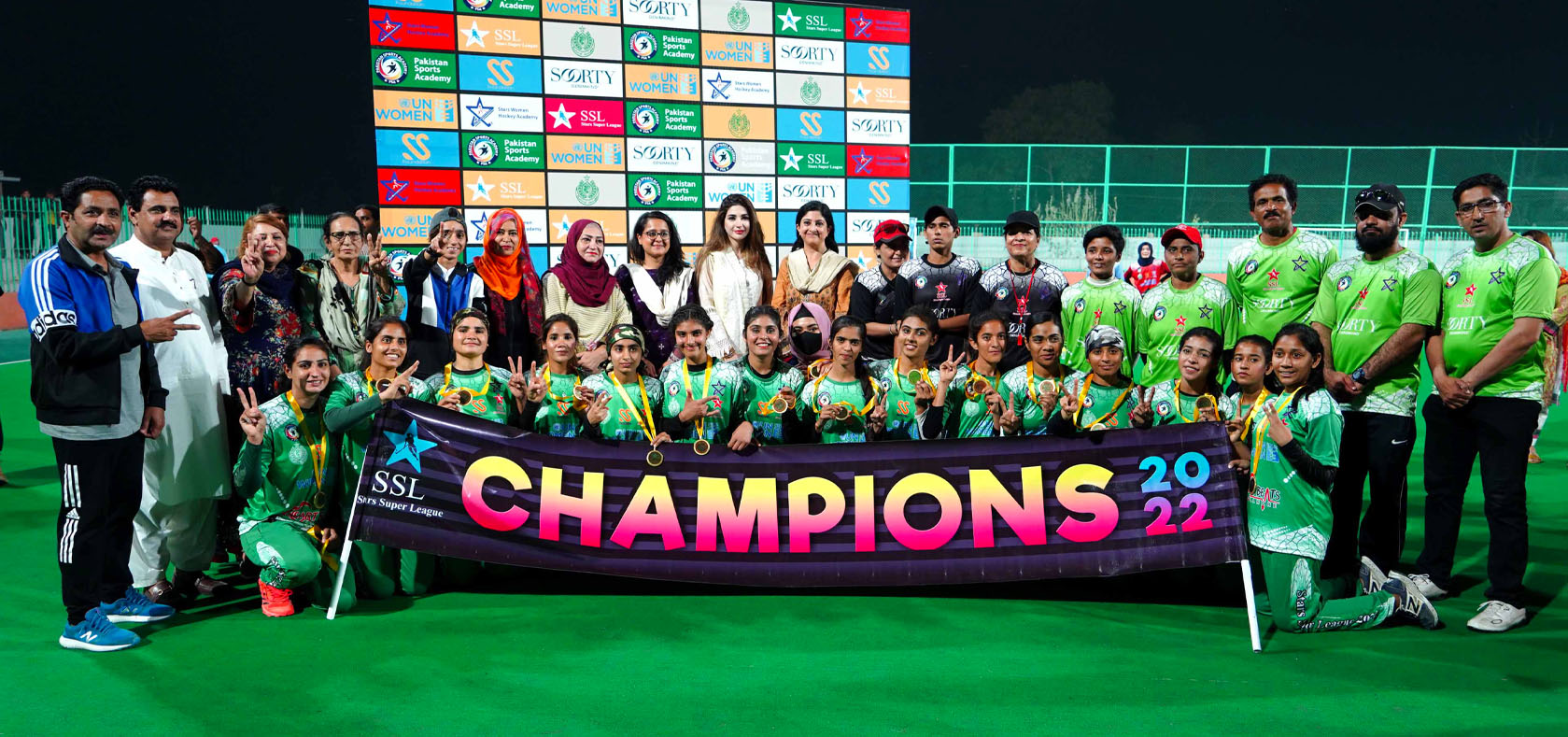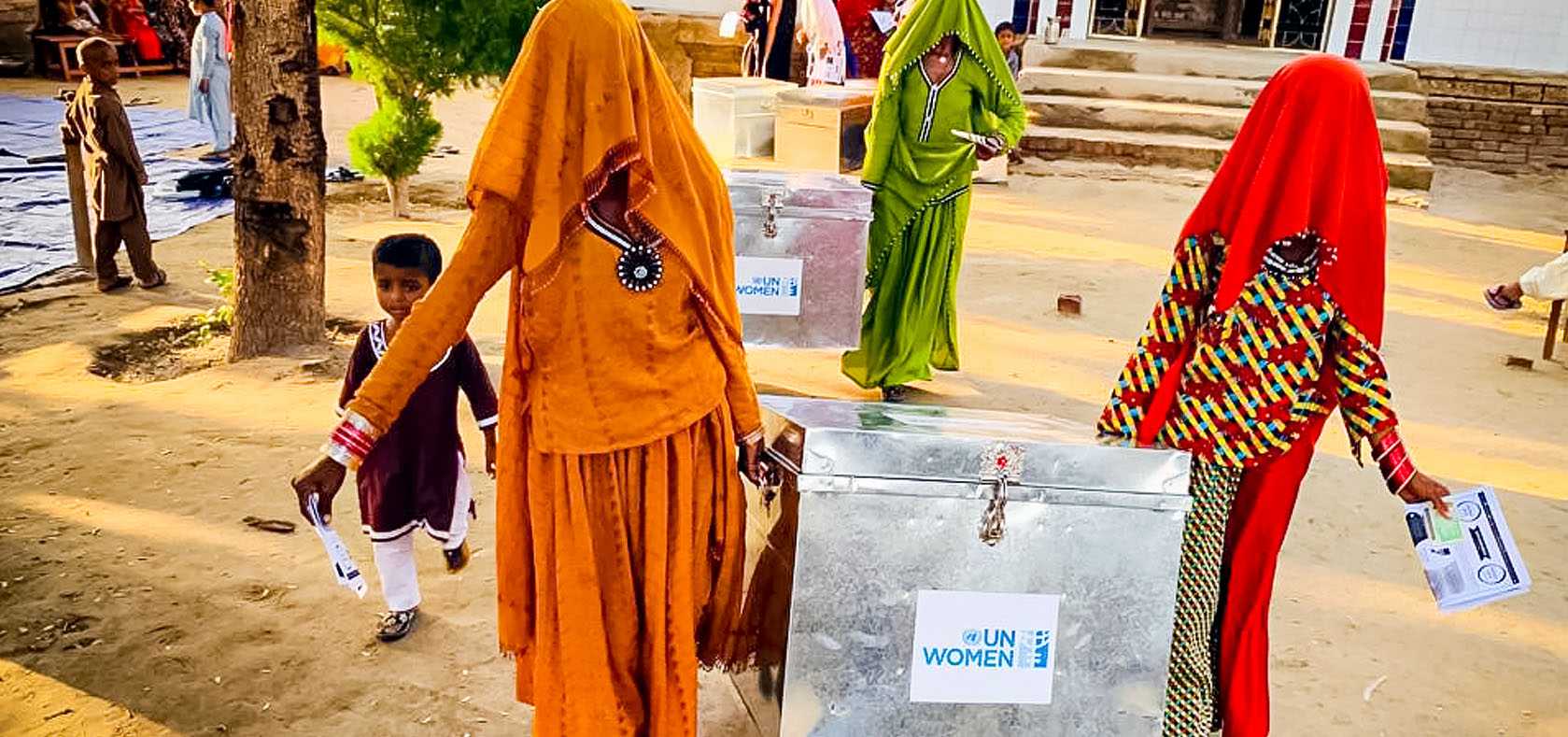Women, Peace and Security and Humanitarian Action

The peace and security landscape in Pakistan faces unique challenges, stemming from regional instability, growing divisions within diverse communities as well as divisions perpetuated by emergency situations and crises like climate shocks/disasters and COVID-19 pandemic. Social, economic and political polarization has deepened fissures in communities, as threats of intolerance, misogyny, hate speech against minorities and extremist ideologies– especially towards women – often result in violence, even in virtual spaces. There are a range of factors that contribute to this, though they vary geographically within the country. Exclusion from democratic processes, cultural norms, social biases and militant violence further dissuade youth and women’s participation in the civic space.
The Government of Pakistan has voiced its commitment to the framework that views women and youth as cornerstone of peacebuilding.[1] In its first National Security Policy (2022-2026), the Government of Pakistan recognized ‘gender security’[2] as a key pillar and aimed to “ensure integration of gender equity into national security narratives through full and meaningful participation of women in decision-making, law enforcement, justice sector, and peacekeeping.”[3] Pakistan also remains one of the 6th largest contributors to UN peacekeeping, including female engagement teams and troop contribution.
From a regional perspective, the takeover of the Afghan Taliban in August 2021 resulted in an influx of refugees (mostly women, children and adolescents) in the border areas of Pakistan.[4] Pakistan already hosts approximately 1.4 million Afghan refugees[5] making it the third-largest host country of refugees in the world. Displaced and host populations are affected by scarce social services and limited livelihood options. Women and youth have also limited access to alternative platforms to engage with each other and host communities which results in isolation and a sense of social deprivation – weakening social cohesion in communities.
There have been emerging security issues and challenges linked to climate change. Pakistani communities, especially women, are becoming more vulnerable to disaster-driven displacement due to socially constructed roles and responsibilities and patriarchal norms. Women tend to experience a prevalence of sexual and gender-based violence, human rights abuses, an economic instability, a lack of access to information, services and resources, along with discrimination in employment and land rights. Sustainable peace and security requires the full and equal participation of women. However, the crucial and meaningful role of women in humanitarian response, disaster management and preparedness and in building resilient communities has yet to be fully recognized.
Implementing the Women, Peace and Security Agenda

In response to the Women, Peace and Security Agenda, guided by 10 UN Security Council resolutions,[6] UN Women Pakistan has identified the following areas where integrating a gender perspective can best strengthen responses to building social cohesion, and support the implementation of the WPS agenda:
- Engaging Vulnerable Women and Youth to Build Social Cohesion: UN Women engages women, young women and men to contribute to local-level conflict prevention efforts and promote diversity and tolerance through soft interventions like sports, arts, culture, and music and in online spaces. Young people are capacitated on leadership, conflict management, and by implementing local peacebuilding initiatives with the aim to reduce economic marginalization to contribute to social integration.
- Strengthening Local Women Groups and CSOs: UN Women works with civil society actors, especially women-led, in recognition that they are keys in contributing to lasting peace as they utilize local approaches to addressing conflict and emergency situations. UN Women works towards building a peace network of local organizations, building their knowledge and capacity on conflict prevention and implementing gender sensitive interventions.
- Gender-Sensitive Peacekeeping: UN Women engages with Centre for International Peace and Stability (CIPS) to promote women’s leadership and effective role as peacekeepers. UN Women’s works focus on gender sensitization, especially of Female Engagement Teams, joint research studies and advocacy around the inclusion and participation of women in peacekeeping missions.
- Expanding Support to Regional Peace Initiatives: UN Women works to strengthen and participate in regional peace and stability initiatives through Pak-Afghan Track II diplomacy dialogues, trust-building, and capacity building of displaced populations. In addition, through the Women’s Peace and Humanitarian Fund, it works with local organizations for the socio-economic recovery and political participation of Afghan women and girls.
- Strengthening women's leadership in disaster management and responses: UN Women works with local women and public and private sectors at the federal, provincial, district and community levels in addressing the immediate and unmet needs of livelihoods/income recovery, awareness on COVID and other disaster prevention and response mechanisms and access to services for female headed households, women in the informal sector and women in most marginalized areas.

Partners and Stakeholders
UN Women Pakistan UN Women Pakistan continues to build momentum on the WPS agenda by building a trust-worthy partnership with government institutions, academic institutes and civil society organizations.
- National Counter Terrorism Authority of Pakistan (NACTA)
- Centre for International Peace and Stability (CIPS)
- Religious stakeholders and institutes like Paigham e Pakistan and/or Council of Islamic Ideology (CII)
- Local NGOs including but not limited to PAIMAN Alumni Trust, Pakistan Village Development Program, and National Dialogue Forum
- STATEMENT OF PAKISTAN AT THE 2016 WPS DEBATE
- The National Security Policy 2022-2026
- ibid
- UNHCR estimates that more than 70,000 Afghan refugees are Persons with Specific Needs (PWSN) and face additional challenges (children at risk, women at risk, single parents, older persons at risk, persons with serious medical conditions)
- Apart from this, Pakistan hosts 840,000 Afghan Citizen Cardholders (ACC) and an estimated 500,000 undocumented Afghans. UNHCR Pakistan
- These are 1325, 1820, 1888, 1889, 1960, 2106, 2122, 2242, 2467, and 2493